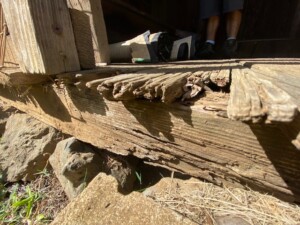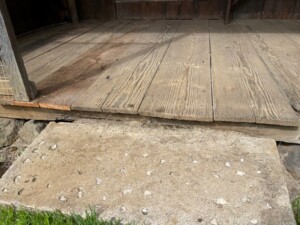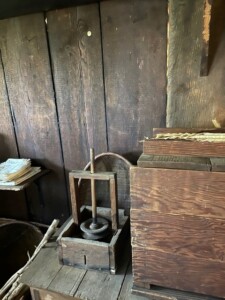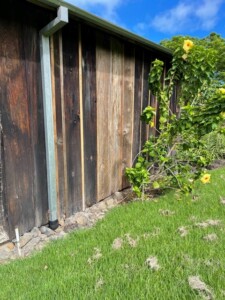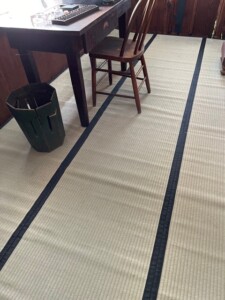11/1/21: One of the key features in Japanese architecture is the “genkan”, a traditional entryway where a person sits to remove their shoes. At the Uchida Farmhouse at the Kona Coffee Living History Farm, the genkan is a double door entry to the living room and a single door into the kitchen area.
The genkan and other important features of the 1920’s era coffee farm were recently restored by Kona Historical Society with a grant from the Freeman Foundation, in cooperation with Historic Hawai‘i Foundation.
- Genkan entry at the Uchida Farmhouse at the Kona Coffee Living History Museum was repaired under a recent preservation project.
- Before (left) and after (right). Photos courtesy Kona Historical Society.
The Uchida family homesteaded the farm from 1913 until 1994. After the oldest son retired, the farm was added to the Kona Historical Society holdings to be managed as a living history museum to tell the story of coffee cultivation in Kona, including the stories of Japanese immigrants and the legacy of this agricultural industry. The site is listed on the Hawai‘i and National Registers of Historic Places.
In 2017, HHF provided a grant to replace the roof on the 3-bedroom, single-story vernacular house. Other projects have also helped restore the kuriba (coffee cherry processing mill) and hoshidana (coffee drying platform). Kona Historical Society (KHS) then turned its attention to other restoration projects at the farmhouse.
The preservation grant allowed KHS to repair the genkan, replace damaged exterior wall boards and battens in order to address structural rigidity and water-tightness, replace floorboards and goza mats, repair broken window glass and to address hazardous materials in the canec ceilings.
KHS Executive Director Ku‘ulani Auld said that the focus was on addressing floorboards and wall boards that were compromised by moisture or termite damage to the extent that they had failed or were in imminent danger of failure. She credits Paul Donoho for the project architecture and Tinguely Development for conducting the project.
They took care to match the dimensions and aged appearance of the board and batten walls by sourcing aged lumber from Washington State. Goza mats were custom ordered from Tokoyo Tatami Maker in Okayama Japan to replace the termite damaged mats in the study and sewing room.
While the site is closed to the public during the Covid-pandemic, KHS says they are re-installing the farm house furnishings and adjusting visitor programming for safety considerations when they reopen.
- Interior kitchen walls were sealed to protect them from moisture.
- Exterior wall boards were replaced and treated to retain an aged appearance.
- Newly installed goza mats in the study room.
This article appeared in the November 2021 issue of HHF’s Historic Hawai‘i News printed newsletter. A subscription to the newsletter is one of the benefits of being a member of Historic Hawai‘i Foundation. To join our community of people who value historic places, visit: https://historichawaii.org/donate-to-hhf.


